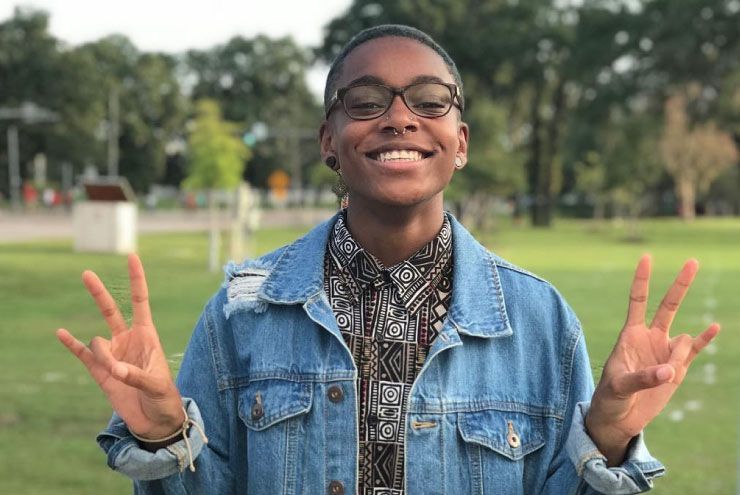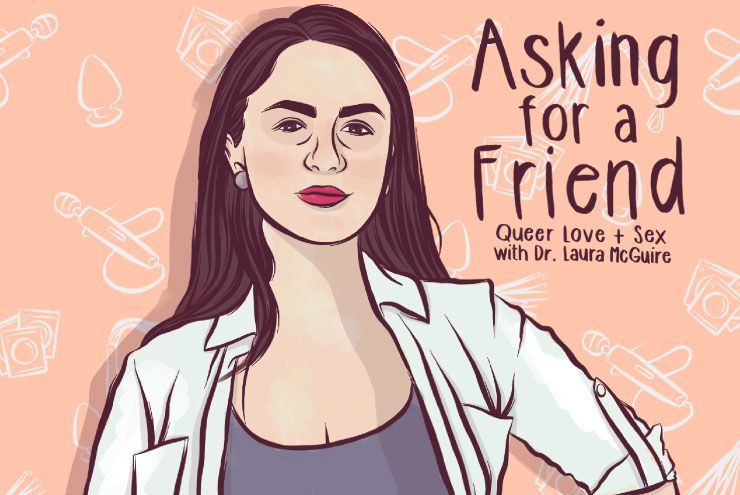Editor’s note: This is an installment of Transouthern Youth, a Spectrum South original series spotlighting transgender youth across the South.
By Megan Smith
On the track, University of Houston freshman Mycah Angelou Taylor’s journey is clear—get from point A to point B as fast as possible. Their personal journey to finding and embracing their identity, however, has been much less linear.
“I started questioning my freshman year of high school, but I didn’t even know I was questioning,” laughs the 18-year-old San Antonio native. “My friend at the time noticed that whenever people would call me ‘she,’ I would cringe involuntarily. I didn’t even know I was doing it. So they asked me about it. They said, ‘Hey, you seem uncomfortable with ‘she.’ Are you transitioning?’ And I was like ‘Oh, I don’t know.’ So that’s when I started researching.”
Their exploration led them to initially adopt the label “genderfluid,” a term that seemingly explained their affinity for both female- and male-gendered clothing, they say. “But I feel like I got expression mixed up with identity,” Taylor explains. “Because there are some days I want to wear a crop top or something. I thought, ‘Oh, if I want to do this, I must identify as female or something along the feminine side. So I thought that meant I was genderfluid. But I was still uncomfortable, [even using that label]. I didn’t fully identify as a male either, so I thought, ‘Well, what can I be?’ Then I came along ‘non-binary.’ I know it’s an umbrella term, but I like it a lot because it means neither gender. But I would consider myself transmasculine because I identify more on the masculine side.”
Over the next few years, Taylor personally embraced their non-binary identity and, as their comfort level grew, they began to come out to close friends. Their junior year of high school, they decided to take the significant step of telling their teachers at school, and senior year, they came out to their dad. “My dad was really cool about it. I told him around 6:00 a.m. and then I ran off to school,” Taylor laughs. “He still Googles things and asks me questions about it, and I think that’s really cool.”
While Taylor’s high school teachers respected their name change, their track team coaches were another story. “My coaches didn’t respect my name or my pronouns,” they share. “It kind of sucked, because whenever you get announced [at a meet], you want to hear your correct name, and that didn’t happen.” Taylor explains that hearing the incorrect pronouns and their dead name before a meet often extinguished the positive energy they needed to compete at their fullest. “It’ll ruin you,” Taylor says.
The culture of the track team at the University of Houston, however, has been a pleasant surprise. “In college, my coaches asked me what I would like the announcers to say, and I think that’s really cool. San Antonio is open [to queer and trans folks], but in Houston, we’re embraced a whole lot more. Everyone is super open, and I was initially like ‘I’m confused,’” Taylor laughs. “On the track team, I was honestly really expecting hate, but the whole team is super nice. They’ve asked me a lot of questions to make sure they get everything [about my identity] correct.”
Now in a supportive environment, Taylor feels safe to be vocal about their identity journey thus far. They’ve grown a substantial following on their Instagram, where they advocate for self-care and self-love, as well as promote the idea that you can be happily queer. “I honestly used to hate myself because I wasn’t a part of the ‘norm,’” Taylor says. “I was upset that I identified in that way. I didn’t know what I was going to do, because I didn’t want to be this way. I was worried what my family would think, what my friends would think, and about all of the things I would have to do [to transition]. It just made me sad and upset all of the time. I was dysphoric, but I was upset that I was dysphoric. But I got to a point where it was really bad, and I knew I couldn’t keep going on like this. I can’t continue to be ashamed and upset with who I am. Because yes, it’s difficult, and yes, it’s going to require change, but this is what’s going to make you happy. And when I started taking steps toward what made me happy, I felt a whole lot better. That’s why I advocate self-love, because I know how hard it is to come out and to come to terms with the fact that you are trans in some way. It’s hard and it’s scary. So I want people to know that I know how they feel, and it’s going to be okay.”
“To me, visibility is about letting people know that there’s not one way to be non-binary,” they add. “Non-binary doesn’t just look like white, emo kids. There are kids of color, there are kids who do sports, there are kids who do average kid things and look like everyone else. And I think it’s important that people get to see that, because that’s how it becomes normalized.”
To illustrate the importance of this visibility, Taylor points to their older friend who attends the University of North Texas in Denton, is in the drumline, and is openly trans. “I would totally stalk him and follow him on social media to see what his experience was like,” Taylor laughs. “I would see what his transition was like and how people reacted to him. No one was freaking out, so I thought, ‘Okay, maybe it is okay for me to say something [about my own identity].’ It’s important to have someone to look up to who is further along in the journey that you’re going to be on so that you know the end game is good.”
Taylor’s personal end game is most definitely good. In addition to their career goal of becoming an occupational therapist, they’re currently training for the 2020 Olympics, they’re working hard to get top surgery this June, and they hope to extend their activism by working with Pride Houston to create a storytelling component for queer and trans folks to share their experiences on stage during the festival in order to help kids in attendance who may not be comfortable with themselves yet. When asked what advice they would personally share with these youth, Taylor responds: “Be confident in yourself, because you know that your truth is real and no one can take that away from you. If you want to be visible, know that what you’re doing is helping others. And no matter what anyone says to you, know in your heart that you are real and you are valid. Don’t let anyone take that from you.”
Keep up with Mycah by following them on Instagram.







